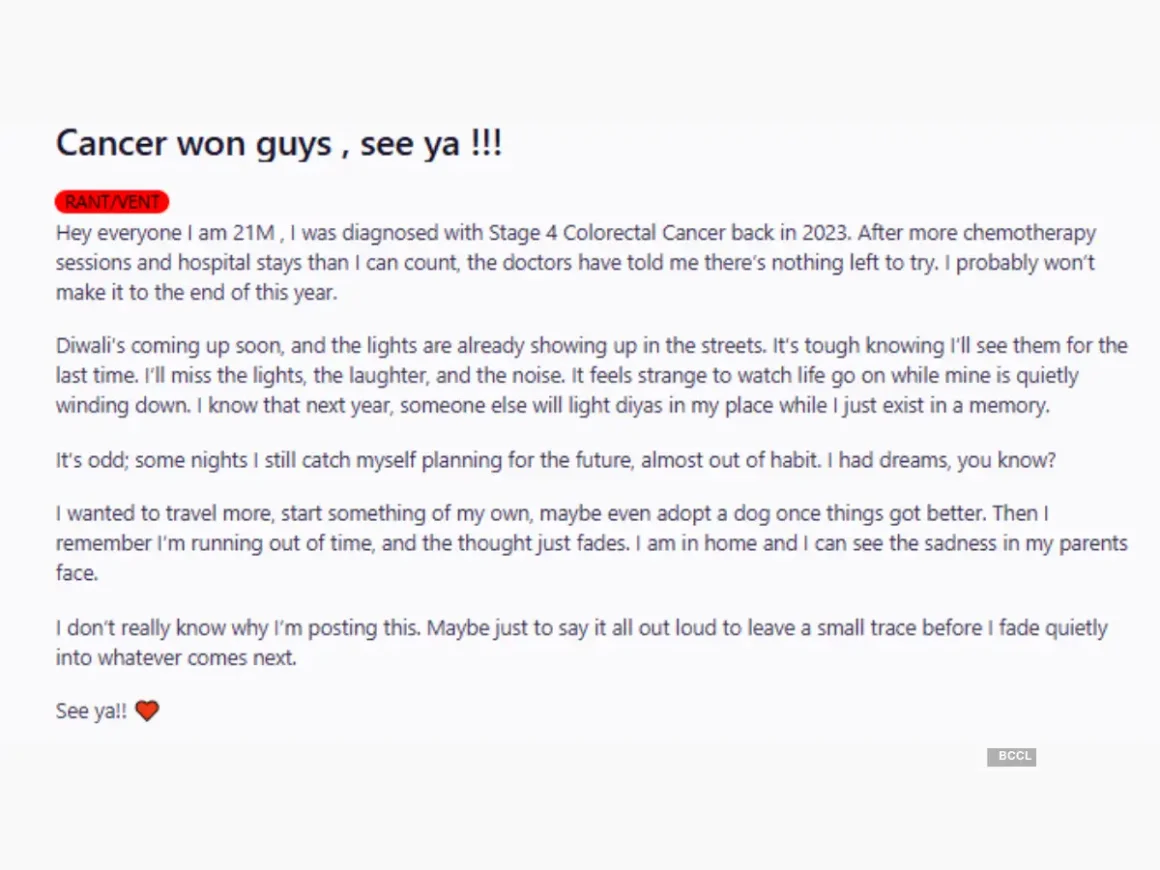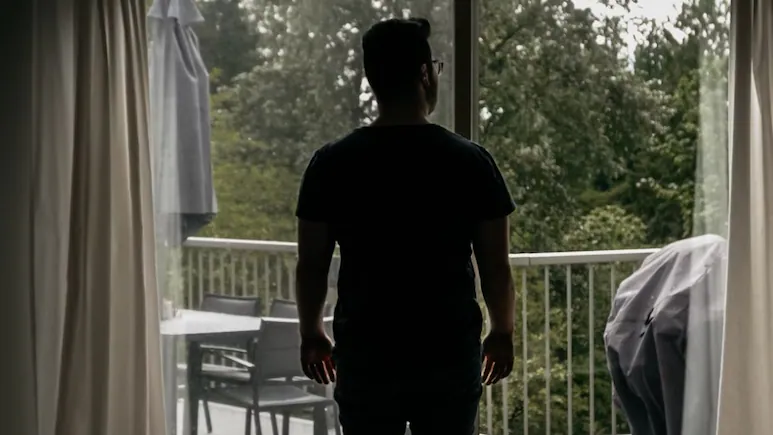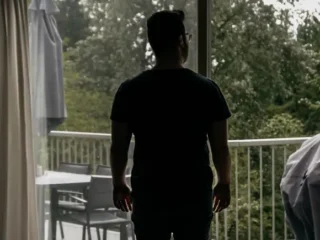New Delhi, 18 October, 2025: At a time when most 21-year-olds are busy planning their futures—college, careers, relationships, travel—one young man is quietly preparing to say goodbye. His viral Reddit post, titled “Cancer won, guys,” captured hearts across India and beyond. The post, shared just before Diwali, reads like a final letter—a deeply personal reflection on life, dreams unfulfilled, and the pain of knowing he may never see another festival of lights.
He is battling stage 4 colorectal cancer, a condition most often associated with people decades older. Yet here he is, confronting the end of his life at just 21, with a clarity and grace that few can muster. As he watches the Diwali lights shimmer outside his window, he writes: “It’s tough knowing I’ll see them for the last time. I’ll miss the lights, the laughter, and the noise.”
His words are not just heartbreaking—they are a wake-up call.

A Silent Illness in the Young
Colorectal cancer—cancer of the colon or rectum—is the third most common cancer worldwide. Traditionally considered a disease of older adults, particularly those over 50, colorectal cancer is now increasing among younger populations. Studies over the past decade have shown an alarming rise in young-onset colorectal cancer (also known as EOCRC—Early-Onset Colorectal Cancer), affecting individuals in their 20s, 30s, and 40s.
This young man’s story is a painful but important reminder that cancer does not follow rules, and that age is no longer a shield.
Understanding Colorectal Cancer
Colorectal cancer begins in the colon or rectum, parts of the digestive system. Most cases begin as non-cancerous polyps, small growths on the inner lining of the colon. Over time, some polyps can turn cancerous.
When caught early, colorectal cancer is highly treatable. But the challenge lies in the fact that symptoms are often mild, mistaken, or ignored, especially in young people.
Common early symptoms include:
- Changes in bowel habits (constipation or diarrhea)
- Blood in stool
- Persistent abdominal pain or bloating
- Fatigue or weakness
- Unexplained weight loss
In the case of this 21-year-old, his cancer had already reached stage 4—meaning it had spread to other parts of the body, such as the liver or lungs. At this stage, treatment becomes more about prolonging life and improving comfort than achieving a cure.
“There’s Nothing Left to Try”
In his Reddit post, the young man shared that he had been diagnosed in 2023. He underwent rounds of chemotherapy, hospital stays, and likely endured all the painful side effects that come with cancer treatment: nausea, hair loss, weakness, and emotional exhaustion.
And then came the worst news: the treatments had stopped working.
“My doctors have said there’s nothing left to try. The cancer’s spread, and my body’s just not responding anymore,” he wrote.
His words carry the weight of acceptance. Not anger, not bitterness—just a quiet, almost serene acknowledgment of the inevitable.
“I wanted to travel more, start something of my own, maybe even adopt a dog once things got better.”
The Emotional Weight of a Final Festival
For millions across India, Diwali is a time of joy, reunion, sweets, light, and celebration. But for this young man, the lights took on a new meaning.
“I’ve always loved Diwali lights. But this year, it’s tough knowing I’ll see them for the last time.”
His post isn’t only about dying. It’s about grief for the life that could have been. The love he won’t experience. The career he won’t build. The family he’ll never have. His sadness is quiet, but devastating.
“Maybe I’m writing this just to say it all out loud, to leave a small trace before I fade quietly into whatever comes next.”
His words are a gift to all of us—an invitation to pause, reflect, and re-evaluate what we take for granted.
Why Are Young People Getting Colorectal Cancer?
Researchers are still investigating the reasons behind the spike in early-onset colorectal cancer, but several factors may be contributing:
- Dietary Changes:
High consumption of processed foods, red meat, and low fiber diets have been linked to colorectal cancer. - Sedentary Lifestyle:
Physical inactivity and obesity are known risk factors. - Gut Microbiome Disruption:
Imbalances in gut bacteria, possibly from antibiotic overuse or poor diet, may play a role. - Genetics and Family History:
Inherited syndromes like Lynch syndrome or familial adenomatous polyposis can drastically increase risk. - Delayed Diagnosis:
Young people—and sometimes their doctors—don’t suspect cancer when symptoms appear, leading to late-stage detection.
Lessons from a Life Cut Short
This young man’s story, though deeply personal, shines a spotlight on a broader issue: how we view health, age, and illness.
1. Early symptoms should never be ignored
A change in bowel habits, unexplained fatigue, or bleeding may not always be “nothing.” Early detection can save lives—even in the young.
2. Routine screening matters
Colonoscopy is the gold standard for detecting colorectal cancer, but it’s rarely offered to young people. Medical guidelines may need to shift to reflect rising cases in younger populations.
3. Mental health support is crucial
Facing a terminal illness at any age is traumatic—but even more so in early adulthood. Access to palliative care and psychological support should be part of every cancer journey.
4. Life is fragile
This story is a stark reminder that we don’t know how much time we have. Gratitude, kindness, and presence matter more than we often realize.
What Can You Do?
- Listen to your body: Don’t ignore persistent symptoms, even if you’re young.
- Advocate for yourself: If a doctor dismisses your concerns, seek a second opinion.
- Support awareness: Talk to friends and family about rising cancer risks and the importance of early detection.
- Practice compassion: Whether someone is struggling with illness, mental health, or invisible pain—kindness can make a difference.
- Cherish time: Don’t wait for a diagnosis to start living more fully.
A Legacy in Words
Though the young man didn’t ask for sympathy, his words left an undeniable impact. Thousands responded with messages of love, prayers, and gratitude. Some shared their own stories of loss. Others promised to pay more attention to their health. Many simply said: “Thank you.”
And perhaps that’s the most meaningful legacy of all—not fame or wealth, but a message that touches people deeply, in their quiet moments.
As Diwali approaches, his post lingers like an echo—a flicker of light in the darkness.
“I just want to go quietly. But maybe someone will read this and think differently about life, or love, or even their own health.”
This isn’t just a story about cancer. It’s a story about time. About what we do with the limited moments we have. About how every single day, no matter how ordinary, can be a gift.
To the young man who shared his story: your words won’t fade. They will live in the hearts of those you’ve moved.
And to everyone reading: let this be your sign to check in—with your body, your mind, your loved ones.
Life is short. Make it meaningful.






